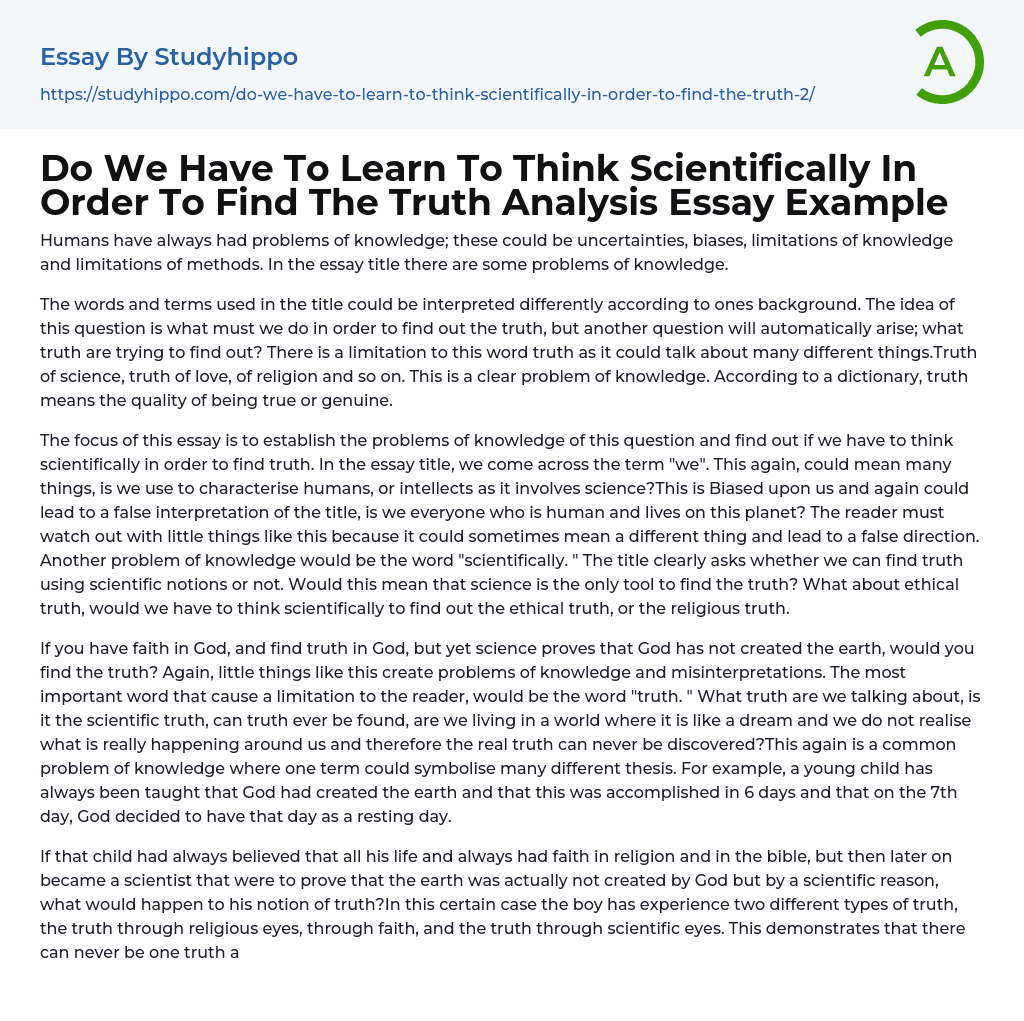

Do We Have To Learn To Think Scientifically In Order To Find The Truth Analysis Essay Example
The essay's title refers to knowledge problems that humans have encountered throughout history. These challenges include uncertainties, biases, limitations in understanding, and research methods.
Depending on one's background, the meaning of the words and terms in a title can differ. The question about determining truth raises another question: what type of truth are we searching for? "Truth" is a term that encompasses various concepts like scientific truth, love truth, religious truth, and more. This creates an issue with knowledge since it limits our understanding. According to the dictionary, truth is defined as being authentic or genuine.
The essay discusses identifying knowledge-related problems in a question and determining if scientific thinking is required to uncover truth. The title uses "we," which could refer to humans or intellects involved in science, leading to potential mi
...sinterpretation. Moreover, the use of "scientifically" raises concerns about whether science is the sole method for discovering truth and its connection to ethical or religious truth.
Scientific evidence that contradicts the creation of the earth by God can challenge one's faith and belief in divine truth. Such conflicts create knowledge problems and misunderstandings, as the term "truth" has limitations in its interpretation. It is crucial to question which type of truth is being referred to - scientific, absolute or beyond our understanding. This dilemma highlights a common issue in knowledge where a single term can embody multiple ideas. For example, a child's notion that God created the earth in six days and rested on the seventh may clash with scientific evidence.
If a child who had always had unwavering faith in religion and the Bible were to become a scientist and prove that the Earth wa
not created by God but by scientific means, it would challenge his notion of truth. This scenario highlights that people experience different types of truth throughout their lives, some through religious lenses and others through scientific lenses. The existence of multiple truths showcases that people around the world have varying beliefs, cultures, and age groups, causing their perspectives to differ. As age plays a significant role in shaping beliefs, what one believes at age 10 may not be believed at age 30. While science can lead to finding certain aspects of truth, such as the "scientific truth," it dismisses other truths not explainable through scientific means. Therefore, those relying solely on scientific methods may overlook religious truths that involve faith.
In every life, there will always be issues with understanding. Some things may not be universally understood, leading to potential misinterpretations - for instance in marketing and advertising. The primary obstacles to knowledge are uncertainties, biases, limitations to knowledge, and limitations to methods.
People have different backgrounds and ways of thinking, leading to knowledge problems. The title "do we have to learn to think scientifically in order to find the truth" raises uncertainties, biases, and limitations. The answer is partly yes - we need to think scientifically to find "scientific" truth. However, if truth is viewed more broadly, there are other types of truth beyond science, making the answer no.
The essay title's terms are inaccurate because some truths contradict scientific truth. While the essay title focuses on scientific truth, there exist numerous other truths. The question of whether the title is accurate or not cannot be answered definitively as it depends on the interpretation.
- Animals essays
- Charles Darwin essays
- Agriculture essays
- Archaeology essays
- Moon essays
- Space Exploration essays
- Sun essays
- Universe essays
- Birds essays
- Horse essays
- Bear essays
- Butterfly essays
- Cat essays
- Dolphin essays
- Monkey essays
- Tiger essays
- Whale essays
- Lion essays
- Elephant essays
- Mythology essays
- Time Travel essays
- Discovery essays
- Thomas Edison essays
- Linguistics essays
- Journal essays
- Chemistry essays
- Biology essays
- Physics essays
- Seismology essays
- Reaction Rate essays
- Roman Numerals essays
- Scientific Method essays
- Mineralogy essays
- Plate Tectonics essays
- Logic essays
- Genetics essays
- Albert einstein essays
- Stars essays
- Venus essays
- Mars essays
- Evolution essays
- Human Evolution essays
- Noam Chomsky essays
- Methodology essays
- Eli Whitney essays
- Fish essays
- Dinosaur essays
- Isaac Newton essays
- Progress essays
- Scientist essays



